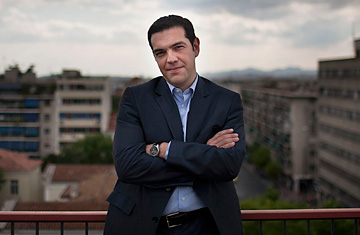
Greek Politician Alexis Tsipras, on the rooftop of Syriza Party Headquarters.
(5 of 5)
Why?
I don't find it useful to speak in detail about this plan, given that a public display of it would suggest that we're leaning towards it. On the contrary, we want to avoid it. We are fully aware of the consequences. We are fully aware of the consequences that it will have on the country and Europe in general.
However, our European partners, our debtors, those with whom we will negotiate, that they will not be an easy and scared opponent on the other side of the table. We are have decided to take what we deserve, because we owe it to the Greek people and the future generations.
How do you reconcile the fact that Syriza has a strong following among civil servants and the unemployed? One group has benefited from the political system in the last four decades, the other has suffered the consequences of the inefficiency and inequity it bred. How can you keep both groups happy?
Look... We don't want apologize ourselves for a public sector that we didn't create. The two parties [PASOK and New Democracy] that shared power in Greece created this image. Because in order to keep their voters as hostages, and especially the young people, they were promising them jobs, they hired them with temporary contracts, in some cases they even gave them a permanent job, without addressing the real needs of the public sector, in order to make it more efficient, more functioning, following instead their own clientelistic needs.
On the other hand however, we have to see the reality of today. What is that reality? Greece has an inefficient public sector, structured in an irrational way. It is not a bloated public sector. As far as size is concerned, it corresponds pretty much to the EU average. What is needs to be done?
We need to see the gaps, the shortages and the surpluses. If for instance you visit a public hospital, you will conclude that the shortages are tragic when it comes to human resources. You will see that for a wing of 40 patients, there is only one nurse that can not cope with their needs.
Therefore, in the public hospitals, more public servants are needed. If for instance you go to a service, let's say, for tax evasion, in a tax collecting service, you might find out that there is a surplus or that those who are there are not efficient.
This is just an example. If you go to the offices of members of parliament or of the ministers, you will see that there are dozens or hundreds of "dispatched" and some of them might even be sinecure jobs [where they're paid without doing anything].
We need to deal with this dysfunction and this irrationality but not with horizontal cuts and lay-offs. Because if you do it this way and not in a targeted way, you will destroy completely the state, you will destroy the welfare state, you will have no hospitals, no schools.
Therefore, the public sector, and how you will bring health to it, how you will make it more effective, and more socially efficient, is a very sensitive issue, that we have to approach with attention. In no way do I want to defend what the forces of yesterday created, the forces of the two parties in power that looted in the last twenty years the state and social wealth of our country.
What do you think about the political cartoons which depict Merkel as a Nazi?
I don't agree. It's unfair and this course must absolutely be reversed. But the reversal of these attitudes must be driven by mutual initiatives. German leaders must understand that they should not insist on the same hard fiscal proposals, and more importantly, they should not insult the dignity of the Greek people. Greece is a sovereign country, not a German colony.
It's unacceptable for Mr Schaueble to indicate us when we will make elections or for Mrs Merkel to tell us when and on what question we will hold a referendum in Greece.
Do you think Greece should look at East, Russia or China....
I'm not naive to believe that there are easy solutions or a deus ex machina. Greece should have a special role, an active and multidimensional foreign policy.
It is and should remain an integral part of European Union, but it is also an important country. It is not a big one, but it is important in East Mediterranean region. It is the pillar of three continents and three different cultures. Moreover, it is the region where the new energy routes will pass. Greece's geostrategic role is important and it shouldn't lose it.
In my point of view, it should develop further its relationship with Russia and China and restore those with other regional powers, as long as there is no dispute of the international law and the sovereign rights of the the country.
We should restore our relations with Turkey, which is an important regional power. Greece should be considered as a country with an important geostrategic role in the region, not as a country given over to the West and a Europe which is led by countries with credit rating AAA. It should be an equal member in European Union and at the same time ready to meet the challenges, which are plenty in our region.
Do you think the Euro zone will survive?
I hope. I hope because Europe should have a special role on global scale, as a stability and security power between USA and the rising superpowers which compete each other.
Also it has an important role on the geopolitical board. I believe that it would be a tragedy if the euro, the second biggest reserve currency in the world, collapsed. Europe can be an important, strong international power only by respecting its traditional values: democracy, social cohesion and solidarity.
